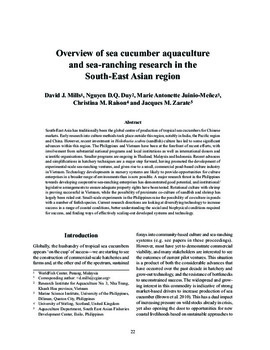Overview of sea cucumber aquaculture and sea-ranching research in the South-East Asian region

Citation
Mills, D.J. et al. (2012). Overview of sea cucumber aquaculture and sea-ranching research in the South-East Asian region. p. 22-31. In: Hair, C.A. ; Pickering, T.D. ; Mills, D.J. (eds.) Asia-Pacific tropical sea cucumber aquaculture. Proceedings of an international symposium held in Noumea, New Caledonia, 15–17 February 2011. ACIAR Proceedings No. 136. Australian Centre for International Agricultural Research, Canberra. 209 p.
South-East Asia has traditionally been the global centre of production of tropical sea cucumbers for Chinese markets. Early research into culture methods took place outside this region, notably in India, the Pacific region and China. However, recent investment in Holothuria scabra (sandfish) culture has led to some significant advances within this region. The Philippines and Vietnam have been at the forefront of recent efforts, with involvement from substantial national programs and local institutions as well as international donors and scientific organisations. Smaller programs are ongoing in Thailand, Malaysia and Indonesia. Recent advances and simplifications in hatchery techniques are a major step forward, having promoted the development of experimental-scale sea-ranching ventures, and given rise to a small, commercial pond-based culture industry in Vietnam. Technology developments in nursery systems are likely to provide opportunities for culture enterprises in a broader range of environments than is now possible. A major research thrust in the Philippines towards developing cooperative sea-ranching enterprises has demonstrated good potential, and institutional/ legislative arrangements to ensure adequate property rights have been tested. Rotational culture with shrimp is proving successful in Vietnam, while the possibility of proximate co-culture of sandfish and shrimp has largely been ruled out. Small-scale experiments in the Philippines raise the possibility of co-culture in ponds with a number of finfish species. Current research directions are looking at diversifying technology to increase success in a range of coastal conditions, better understanding the social and biophysical conditions required for success, and finding ways of effectively scaling-out developed systems and technology.
Permalink
Date Available
Type
Copyright
CC BY 4.0
Research Themes
Language